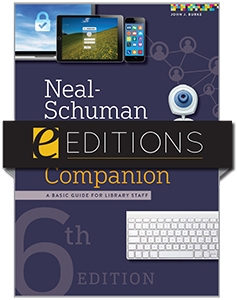
Primary tabs
You don't need to be an ALA Member to purchase from the ALA Store, but you'll be asked to create an online account/profile during checkout to proceed. This Web Account is for both Members and non-Members. Note that your ALA Member discount will be applied at the final step of the checkout process.
If you are Tax-Exempt, please verify that your account is currently set up as exempt before placing your order, as our new fulfillment center will need current documentation. Learn how to verify here.
- Description
- Table of Contents
- About the author
- Reviews
Carrying over the reorganization that made the fifth edition such a convenient learning resource for students and working professionals alike, the newest edition of this comprehensive library technology primer is timelier and more compelling than ever. Burke's guide should be at the top of the reading list for any current or future library professional looking to stay at the forefront of technological advancement. Updated with new case studies to illuminate key areas, its incisive coverage includes
- complete analysis of the librarian's technological toolbox for teaching, security, databases, and more;
- expert advice on how to compare and evaluate competing technology solutions;
- social media, streaming media, and educating patrons about digital privacy;
- makerspaces and other technology programing, including virtual and augmented reality technologies;
- technology lending programs;
- open source catalog systems, discovery layers, and related library management systems;
- websites, web-based services, and free information resources;
- copyright and licensing as they pertain to the use of digital materials;
- new technology predictions for the future, with tips on how to stay up to date with the latest developments; and
- a refreshed glossary of useful terms.
Informed by a large-scale survey of librarians across the spectrum of institution types, this guide will be a true technology companion to readers at all experience levels.
List of Illustrations
Preface
Acknowledgments
Part I: Library Technology in Context
- Chapter 1. The Universe of Library Technology
- Chapter 2. Survey Says: How Library Staff Members Are Using Technologies
Part II: Mission Critical Technologies
- Chapter 3. Free Information Resources: Part of the Library Arsenal
- Chapter 4. Library Electronic Resources: E-books, Full-Text Articles, and Streaming Media
- Chapter 5. Organizing Information to Make It Easier to Find: Library Catalogs, Discovery Layers, and More
- Chapter 6. Computing Devices in Libraries: Desktops, Laptops, Tablets, and Mobile Devices
Part III: Technology That Makes Library Services Run
- Chapter 7. Library Websites and Web Services
- Chapter 8. Social Networking and Patron Participation: Marketing and More
- Chapter 9. How Library Staff Learn and Teach: Screencasts, Distance Learning, and Learning Management Systems
- Chapter 10. Makerspaces and Libraries
Part IV: Building and Maintaining the Technology Environment in Libraries
- Chapter 11. The Right Technology at the Right Time: Planning, Evaluating, Buying, and Implementing Technology
- Chapter 12. Meeting and Supporting Patron Technology Needs: Universal Design and Adaptive/Assistive Technologies
- Chapter 13. Building the Technology Environment: Infrastructure, Ergonomics, and Sustainability
- Chapter 14. Protecting Technology and Technology Users: Securing Collections, Enhancing Computer Security, and Protecting Privacy
- Chapter 15. The Death of Technologies: Preservation Issues and Saying Goodbye
Part V: Where Library Technology Is Going and How to Stay Informed
- Chapter 16. Our Technological Futures: Maintaining Library Services in Infinite Possibilities
- Chapter 17. Keeping Track of Technology Changes
Glossary
Index
John J. Burke
John J. Burke is Library Director and Principal Librarian for the Gardner-Harvey Library on the Middletown regional campus of Miami University (Ohio). He holds an MS in library science from the University of Tennessee and a BA in history from Michigan State University. Prior to his current position, he gained a tremendous amount of experience with technology in libraries at the University of Cincinnati–Raymond Walters College (Ohio) and Fairmont State College (West Virginia). John is a past president of the Academic Library Association of Ohio (ALAO) and a recipient of that organization’s Jay Ladd Distinguished Service Award. He is the author of several other books, including every edition of The Neal-Schuman Library Technology Companion: A Basic Guide for Library Staff. He has presented on a variety of technology topics at conferences hosted by the Association of College and Research Libraries (ACRL) and the American Library Association (ALA), the Library Information and Technology Association (LITA) National Forum, and various regional and state conferences.
"The book is well organized, logically grouping different types of technology and the ways to evaluate them, progressing from the basics to more advanced considerations. Some of the evaluative questions (such as those for web content planning) are especially strong and could be useful for those who are new to thinking about what to look for in different kinds of technologies."
— Doody's
Praise for the fifth edition:
"Technology advances at a startling rate, and this book provides a timely overview of what is taking place in libraries. Whether it's staff using ILL programs or learning about free information options, assisting a patron with setting up a digital projector, or teaching someone how to use social media, library staff are the technocentric community option for all people. This information is essential for keeping libraries vital and this should be required reading for all library staff."
— ARBA
”Useful for any library staff, at any level ... It is an excellent overview of library technology, and it is very thorough yet readable."
— Journal of Hospital Librarianship
"The tips on how to stay current are particularly useful ... Highly recommended to all librarians and staff."
— Public Libraries


